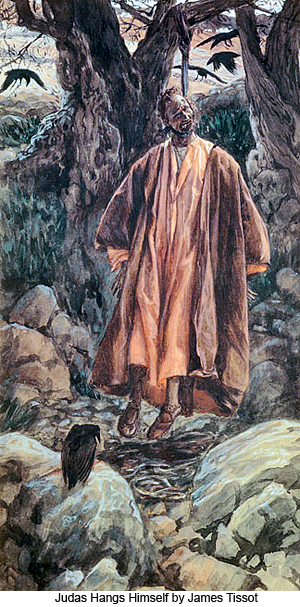As I mentioned in a recent post, there is great difficulty fitting together the information in Matthew and Acts about Judas’ death and his connection with a field known as “The Field of Blood”. One has him buy the field, while the other has the authorities do so with his money. One has Judas fall headlong and burst open, the other has him hang himself. (To see the lengths to which some will go to harmonize them, click here).
 If we speculate and combine the two, we might end up with Judas buying a field for use to bury foreigners who die while in Jerusalem. But then we might begin asking uncomfortable questions about whether there was a particular person from Galilee who died in Jerusalem and whom Judas might want to bury there.
If we speculate and combine the two, we might end up with Judas buying a field for use to bury foreigners who die while in Jerusalem. But then we might begin asking uncomfortable questions about whether there was a particular person from Galilee who died in Jerusalem and whom Judas might want to bury there.
If you ask me whether I think there is good evidence that Judas moved Jesus’ body and buried it elsewhere, and then either killed himself or died suddenly either by accident or because of an illness (perhaps resulting from prelonged contact with a decomposing corpse), I would certainly answer no. That isn’t the point of this post.
What is the point is that, from a historian’s perspective, it will always seem like a more probable explanation than the one Christians more usually give, namely that God transformed Jesus’ body into a resurrection body and removed it from the tomb. Historical study always deals in probabilities, and a unique supernatural event can never be considered more probable.
Here, once again, we see the challenge of historical study to Christian faith. It is not that historical study in general disproves the stories of the astounding and the supernatural on the pages of Scripture. It is that historical study can rarely reach the verdict that the most likely reason we have a miracle story in an ancient text is because a miracle actually occurred. This is no different than the general tendency of juries not to explain deaths in murder trials in terms of supernatural agents and miracles. It is merely that, on the whole, deaths have some cause that is more mundane, and the criminal justice system is designed to deal with those cases. Whether we need to leave a category for “X Files” is another question, but if so, we also need to come up with some sort of ground rules about how to investigate them too.
So what do you think? Can Christians ever be justified on historical grounds in claiming that divine action is the reason the body was not in the tomb? Can we even be certain on historical grounds that the body wasn’t in the tomb? And must we not admit (as I have felt compelled to) that no religious experience, however powerful, can be used to confirm the whereabouts of a body 2,000 years ago? And if all this is the case, then where does that leave Christian belief in the resurrection? Do we simply make a historical argument and then follow it with a leap of faith? Do we reinterpret the meaning of resurrection faith as something experiential and existential rather than historical? Or is some other course open to us?












